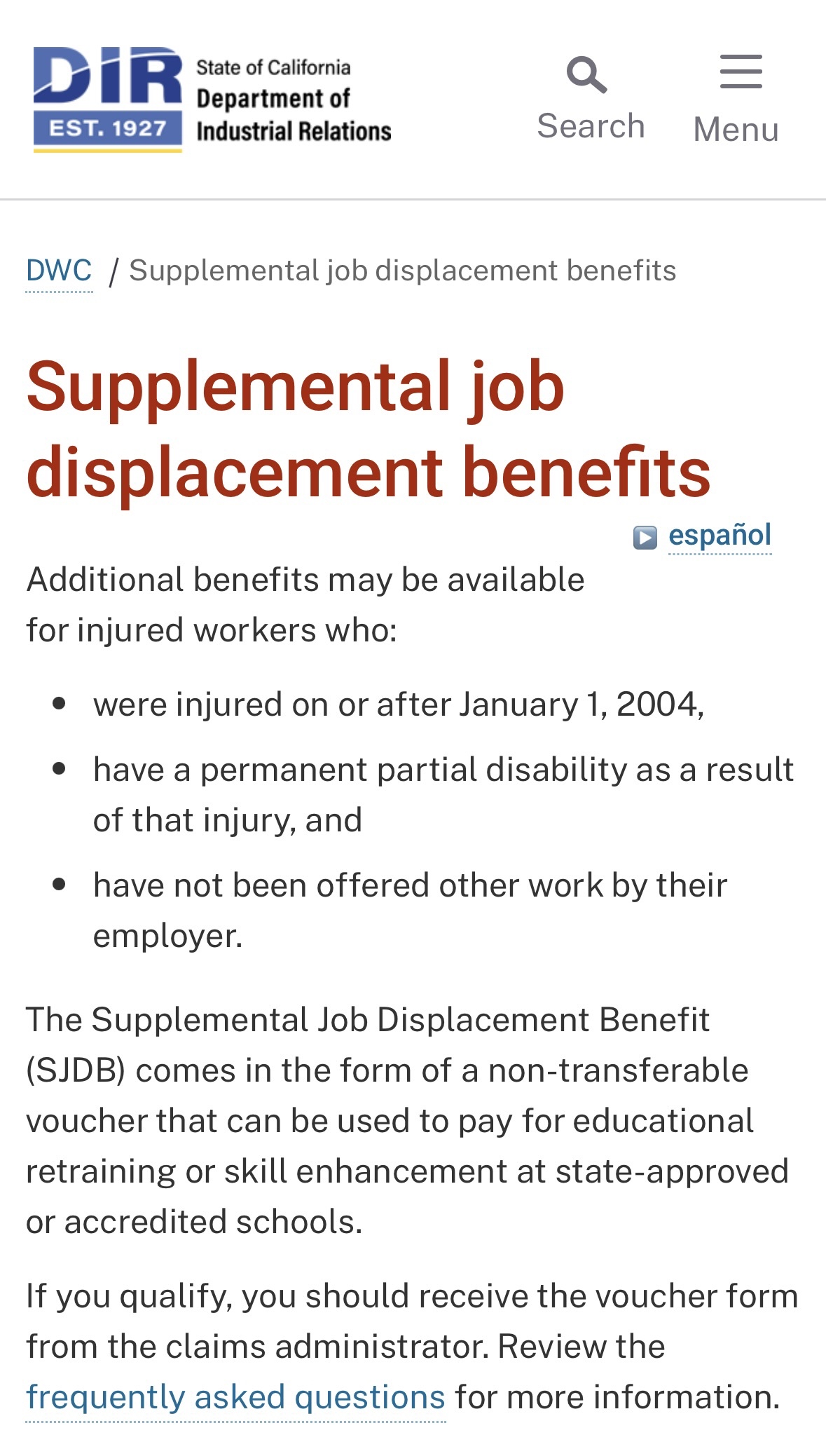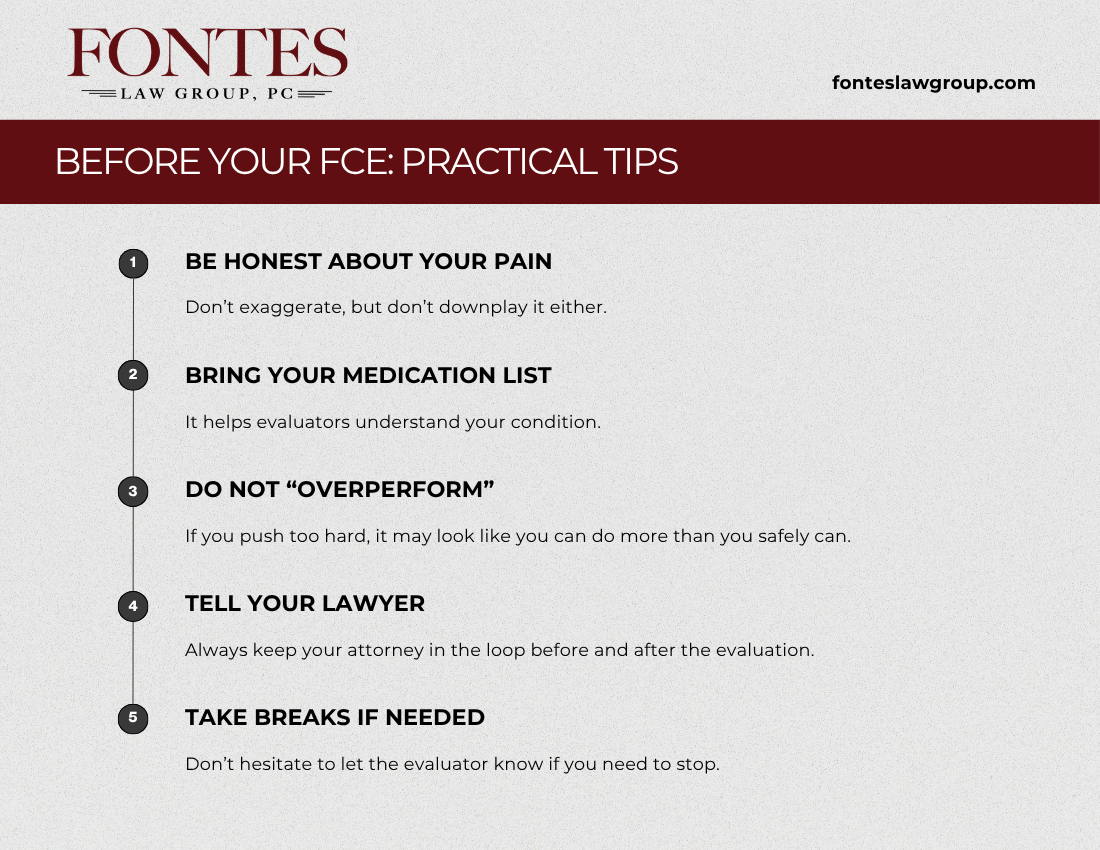Is Settlement in Workers’ Comp Determined by an FCE?
When you’re hurt at work, the whole process of workers’ compensation can feel like a maze.
Somewhere along the way, your doctor or insurance company may bring up something called an FCE, a Functional Capacity Evaluation. And naturally, the question comes up: Does this test decide how much your workers’ comp settlement will be?
The short answer: An FCE can strongly influence your settlement, but it does not determine it outright.
Settlements are based on several factors like medical reports, permanent disability ratings, lost wages, and future medical needs. The FCE is just one piece of evidence that doctors, lawyers, and insurance companies use to decide what you can and cannot do after your injury.
What Is an FCE?
An FCE (Functional Capacity Evaluation) is a series of tests given by a licensed therapist. It measures how your injury affects your ability to perform work-related tasks such as lifting, standing, bending, or sitting for long periods.
Insurance companies use it to see if you can return to your old job, if you need restrictions, or if you might qualify for disability benefits. The evaluation usually takes several hours and may feel like a mix between a physical exam and a job performance test.
An FCE typically looks at:
- Strength and flexibility – Can you lift, reach, or bend without pain or instability?
- Stamina – How long can you stand, walk, or sit before discomfort sets in?
- Coordination and movement – Are your motor skills impacted by your injury?
- Pain responses – Do certain activities trigger symptoms that limit your function?
- Overall capacity – What types of tasks are safe for you to do on a regular basis?
The final report usually includes recommendations about your safe work capacity, potential restrictions, and whether you can return to your old job or need accommodations.
How an FCE Affects Your Workers’ Comp Settlement
While the FCE doesn’t decide your settlement by itself, the results can shape important parts of your claim. Here’s how it plays out in California:
1. Permanent Disability Rating
California assigns a permanent disability (PD) rating to show how much your injury reduces your ability to earn a living. Doctors often rely on FCE results when deciding how severe your limitations are. A higher disability rating can mean a higher settlement.

For example, if the FCE shows you can no longer lift more than 20 pounds, your doctor may assign restrictions that lead to a higher disability percentage, increasing your benefits.
2. Work Restrictions
If the FCE says you can’t go back to your old job, that may increase your settlement value because your earning potential is reduced. Employers may need to offer lighter duties or accept that you cannot return at all, which can drive settlement negotiations.
3. Vocational Retraining
California allows workers who cannot return to their usual job to receive a Supplemental Job Displacement Benefit (a voucher worth up to $6,000 for retraining). An FCE helps document your inability to return to your old work, supporting eligibility for this program.
4. Future Medical Needs
If your FCE shows ongoing pain or limitations, it strengthens the argument for covering future care in your settlement. This could include physical therapy, pain management, or surgeries down the line.
California-Specific Settlement Examples
Case Example 1: Back Injury
A warehouse worker in California injured his lower back lifting heavy boxes. The FCE showed he could not stand for more than 30 minutes without pain and couldn’t lift more than 15 pounds. Based on those findings, his doctor assigned a permanent partial disability rating of 35%. His settlement reflected both his wage loss and the need for long-term pain management.
Case Example 2: Construction Injury
A construction worker fell and suffered a shoulder injury. The FCE revealed he could no longer perform overhead lifting or repetitive arm movements. Since his job required constant use of his arms, he received retraining vouchers and a larger settlement to account for the fact that he couldn’t return to construction work.
Case Example 3: Office Worker with Carpal Tunnel
An administrative worker developed carpal tunnel syndrome. The FCE documented difficulty with typing and gripping. While she could still work with restrictions, her disability rating was lower than someone with a severe mobility injury. Her settlement reflected those limits but was smaller because she could still do some office-based work with accommodations.
These examples highlight how the FCE influences the disability rating and settlement value, but is never the only deciding factor.
What Else Decides a Workers’ Comp Settlement?
Your settlement isn’t based on the FCE alone. Other factors include:
- Medical reports from treating doctors
- Whether your injury is temporary or permanent
- Lost wages and missed work time
- Whether you can return to your old job or not
- California’s disability rating system (California Division of Workers’ Compensation)
- Future care and rehabilitation needs
All of these work together to shape the negotiation process and final outcome.
Before Your FCE: Practical Tips

Fontes Law Group’s Perspective
At Fontes Law Group, we know how stressful it can feel when your health and your financial security are on the line. Many of our clients from Santa Ana, Riverside, and across Southern California worry that one test might make or break their case.
Here’s the truth: the FCE is important, but it’s just one piece of evidence.
Our bilingual team (English and Spanish) works with medical experts to make sure the full picture of your injury is represented. That way, your settlement reflects your real needs, not just the results of a single test.
Because workers’ comp law in California is complex, having an attorney who understands both the medical and legal sides of the process can make the difference between a low settlement and a fair one.
FAQs About About FCE and Settlements
Q: Do I have to take an FCE?
Not always. Sometimes insurance companies request it, and sometimes your lawyer may recommend it to support your case.
Q: Can an FCE hurt my case?
Yes, if the evaluator underestimates your limitations or suggests you can do more than you actually can. That’s why it’s important to be honest during the test but not push yourself beyond your real abilities.
Q: Who pays for the FCE?
Typically, the insurance company covers the cost, not you.
Q: Can I challenge FCE results?
Yes. If you believe the FCE doesn’t reflect your real condition, your attorney can request additional medical opinions or challenge the findings.
Q: Does every settlement involve an FCE?
No. Some cases are settled with medical records alone, depending on the type of injury and the strength of other evidence.
Bottom Line
An FCE doesn’t directly set your workers’ comp settlement, but it can play a major role in shaping it. It provides doctors, insurers, and lawyers with a snapshot of how your injury limits your daily life and work capacity.
At Fontes Law Group, we make sure that your settlement isn’t decided by one test alone. We fight to ensure that every factor, your medical history, future needs, and financial losses, are considered.
Need help understanding how an FCE might affect your case? Fontes Law Group offers bilingual legal support in Santa Ana, Riverside, and across Southern California.
If you are facing a settlement offer or have questions about your rights, contact Fontes Law Group today.
